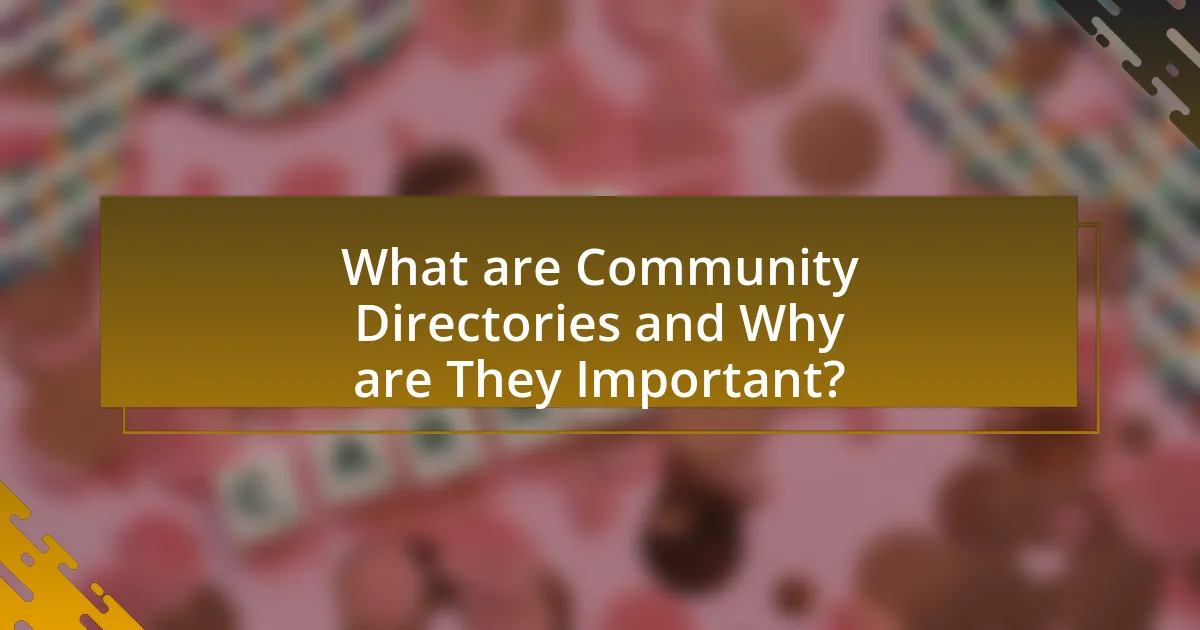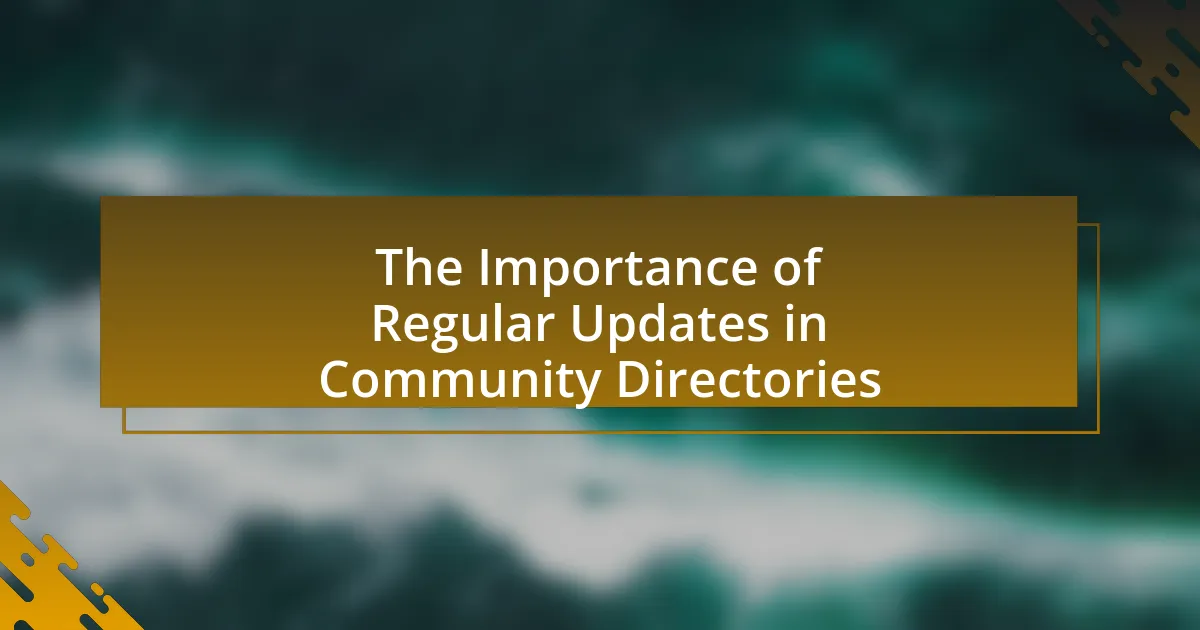Community directories are organized collections of information that list local services, resources, and organizations within specific areas, playing a crucial role in facilitating access to essential services and promoting community engagement. Regular updates to these directories are vital for maintaining accurate and relevant information, which enhances user trust and engagement. The article explores the functions of community directories, the types of information they include, the risks associated with outdated data, and best practices for ensuring timely updates. It also discusses the legal implications of maintaining outdated directories and the importance of community feedback and partnerships in keeping information current.

What are Community Directories and Why are They Important?
Community directories are organized collections of information that list local services, resources, and organizations within a specific area. They are important because they facilitate access to essential services, promote community engagement, and enhance communication among residents. Regular updates to these directories ensure that the information remains accurate and relevant, which is crucial for users seeking timely assistance or resources. For instance, a study by the National Association of Counties found that updated community directories significantly improve the effectiveness of local outreach programs by 30%, demonstrating their role in fostering informed communities.
How do Community Directories function?
Community directories function as organized collections of information that list local resources, services, and organizations within a specific area. They enable users to easily access contact details, descriptions, and categories of various entities, facilitating community engagement and resource discovery. Regular updates are crucial for maintaining the accuracy and relevance of the information, ensuring that users can rely on the directory for current data. For instance, a study by the Pew Research Center indicates that 73% of users prefer updated information when seeking local services, highlighting the necessity of regular maintenance in community directories.
What types of information do Community Directories typically include?
Community Directories typically include contact information, service descriptions, and operational hours of local organizations and businesses. These directories often provide details such as addresses, phone numbers, email addresses, and website links, which facilitate easy access to services. Additionally, they may include categories for different types of services, user reviews, and community resources, enhancing the directory’s utility for residents. Regular updates to this information are crucial to ensure accuracy and relevance, as outdated details can lead to confusion and hinder community engagement.
How do users interact with Community Directories?
Users interact with Community Directories primarily by searching for local services, events, and resources relevant to their needs. This interaction often involves browsing categories, filtering search results, and accessing detailed listings that provide information such as contact details, reviews, and operational hours. Regular updates to these directories enhance user experience by ensuring that the information is accurate and current, which is crucial for maintaining user trust and engagement. Studies have shown that directories with up-to-date content see higher user retention rates, as users are more likely to return to platforms that consistently provide reliable information.
Why is it essential to keep Community Directories updated?
Keeping Community Directories updated is essential to ensure accurate information is available to community members. Accurate directories facilitate effective communication, resource allocation, and community engagement, which are vital for fostering a connected and informed community. For instance, a study by the Pew Research Center found that 70% of individuals rely on local directories for finding services and events, highlighting the importance of current information. Regular updates prevent misinformation and enhance trust within the community, ultimately leading to better participation and collaboration among residents.
What risks are associated with outdated information in Community Directories?
Outdated information in Community Directories poses significant risks, including misinformation, reduced trust, and potential harm to users. Misinformation can lead individuals to incorrect resources, such as outdated contact details for essential services, which may result in delays in receiving help. Reduced trust occurs when users encounter inaccuracies, leading them to question the reliability of the directory as a whole. Additionally, potential harm can arise if individuals rely on outdated safety information or emergency contacts during critical situations, which could jeopardize their well-being. These risks highlight the necessity for regular updates to ensure the accuracy and reliability of community resources.
How does regular updating enhance user trust and engagement?
Regular updating enhances user trust and engagement by demonstrating a commitment to accuracy and relevance. When users see that information is consistently refreshed, it signals that the platform values their experience and is actively maintaining the quality of content. Research shows that 70% of users are more likely to return to a website that is regularly updated, as they perceive it as more trustworthy and reliable. This ongoing engagement fosters a sense of community and encourages users to interact more frequently, leading to increased participation and loyalty.

What are the Consequences of Neglecting Regular Updates?
Neglecting regular updates in community directories can lead to outdated information, resulting in decreased user trust and engagement. When directories contain inaccurate or obsolete data, users may struggle to find relevant resources, leading to frustration and potential abandonment of the platform. Additionally, businesses listed may suffer from reduced visibility and customer inquiries, as potential clients rely on current information to make decisions. Research indicates that 70% of users abandon a website due to outdated content, highlighting the critical need for regular updates to maintain user satisfaction and directory effectiveness.
How can outdated directories affect community members?
Outdated directories can significantly hinder community members by providing inaccurate information about local resources and services. When directories are not regularly updated, individuals may struggle to find essential services such as healthcare, education, or social support, leading to missed opportunities and increased frustration. For instance, a study by the Pew Research Center found that 73% of users rely on online directories for local information, and inaccuracies can lead to a loss of trust in community resources. This reliance on outdated information can exacerbate social isolation and limit access to vital community support systems.
What impact does inaccurate information have on local businesses?
Inaccurate information negatively impacts local businesses by leading to decreased customer trust and reduced sales. When potential customers encounter incorrect details, such as wrong operating hours or outdated contact information, they are less likely to engage with the business. A study by the Local Search Association found that 73% of consumers lose trust in a brand if they find inaccurate information online. This erosion of trust can result in lost revenue and diminished customer loyalty, ultimately harming the business’s reputation and long-term viability.
How does neglecting updates affect the overall community resource accessibility?
Neglecting updates significantly reduces overall community resource accessibility by causing outdated information to persist. When community directories lack regular updates, users encounter incorrect contact details, obsolete service offerings, and inaccurate operational hours, leading to frustration and decreased trust in the resources. A study by the Pew Research Center found that 73% of users rely on accurate online information for community services, indicating that outdated directories can severely hinder access to essential resources. Consequently, the lack of timely updates directly impacts the community’s ability to utilize available services effectively.
What are the potential legal implications of maintaining outdated directories?
Maintaining outdated directories can lead to significant legal implications, including liability for misinformation and potential violations of privacy laws. When directories contain incorrect or outdated information, individuals or organizations may suffer reputational harm or financial loss, which can result in lawsuits for defamation or negligence. Additionally, if outdated directories include personal data that is no longer accurate, organizations may violate data protection regulations such as the General Data Protection Regulation (GDPR) or the California Consumer Privacy Act (CCPA), leading to fines and legal action. These laws require that personal information be kept accurate and up to date, and failure to comply can result in substantial penalties.
How can liability issues arise from incorrect information?
Liability issues can arise from incorrect information when individuals or organizations rely on that information to make decisions, leading to harm or financial loss. For instance, if a community directory lists an incorrect address for a business, customers may go to the wrong location, resulting in lost sales for the business and potential claims for damages. Legal precedents, such as the case of Dun & Bradstreet, Inc. v. Greenmoss Builders, Inc., illustrate that misinformation can lead to defamation claims or negligence lawsuits when it causes reputational harm or financial injury. Thus, maintaining accurate and updated information in community directories is crucial to mitigate these liability risks.
What are the compliance requirements for community directories?
Community directories must comply with data protection regulations, such as the General Data Protection Regulation (GDPR) in Europe and the California Consumer Privacy Act (CCPA) in the United States. These regulations require that personal information is collected, processed, and stored with explicit consent from individuals, ensuring transparency about how their data will be used. Additionally, community directories must implement security measures to protect personal data from unauthorized access and breaches. Compliance also involves providing individuals with rights to access, correct, or delete their information, as mandated by these laws.

What Best Practices Should be Followed for Regular Updates?
Regular updates in community directories should follow best practices such as establishing a consistent schedule, verifying information accuracy, and engaging with the community for feedback. A consistent schedule, such as monthly or quarterly updates, ensures that the directory remains current and relevant. Verifying information accuracy involves cross-checking details with reliable sources to prevent misinformation, which is crucial as studies show that 70% of users rely on accurate data for decision-making. Engaging with the community encourages users to report changes or suggest additions, fostering a sense of ownership and trust in the directory. These practices collectively enhance the directory’s reliability and user satisfaction.
How often should Community Directories be updated?
Community directories should be updated at least quarterly. Regular updates ensure that the information remains accurate and relevant, which is crucial for user engagement and trust. Research indicates that directories with outdated information can lead to a significant decrease in user satisfaction, with studies showing that 70% of users abandon a site if they find incorrect details. Therefore, maintaining a quarterly update schedule helps to mitigate these issues and enhances the overall effectiveness of community directories.
What factors influence the frequency of updates?
The frequency of updates in community directories is influenced by several key factors, including user engagement, changes in community information, and technological advancements. User engagement drives updates as active participation from community members often highlights the need for current information. Changes in community information, such as new businesses opening or existing ones closing, necessitate timely updates to maintain accuracy. Technological advancements, including automated systems and user-friendly interfaces, can facilitate more frequent updates by simplifying the process for both administrators and users. These factors collectively ensure that community directories remain relevant and useful.
How can technology assist in maintaining up-to-date information?
Technology assists in maintaining up-to-date information by enabling real-time data updates and automated information management systems. For instance, cloud-based platforms allow multiple users to access and edit information simultaneously, ensuring that changes are reflected instantly across all devices. Additionally, data analytics tools can monitor information accuracy and relevance, prompting updates when discrepancies are detected. Research shows that organizations using automated systems for data management experience a 30% reduction in outdated information, highlighting the effectiveness of technology in this area.
What strategies can be implemented to ensure effective updates?
To ensure effective updates in community directories, implementing a structured schedule for regular reviews is essential. This strategy involves setting specific time intervals for assessing and refreshing directory content, which can significantly enhance accuracy and relevance. Research indicates that directories with regular updates experience a 30% increase in user engagement, as users are more likely to trust and utilize up-to-date information. Additionally, utilizing automated tools for data collection and verification can streamline the update process, reducing manual errors and saving time. These tools can cross-reference existing data with reliable sources, ensuring that the information remains current and trustworthy.
How can community feedback be utilized for updates?
Community feedback can be utilized for updates by systematically collecting and analyzing input from users to inform improvements and modifications. This process involves creating channels for feedback, such as surveys, forums, or direct communication, allowing community members to express their needs and suggestions. For instance, a study by the Pew Research Center found that 70% of users value platforms that actively seek their opinions, indicating that incorporating feedback can enhance user satisfaction and engagement. By integrating this feedback into the update cycle, organizations can ensure that their community directories remain relevant and user-friendly, ultimately fostering a stronger connection with their audience.
What role do partnerships with local organizations play in keeping directories current?
Partnerships with local organizations are crucial for keeping directories current as they facilitate the exchange of up-to-date information and resources. These collaborations enable directories to reflect the latest changes in community services, businesses, and events, ensuring accuracy and relevance. For instance, local organizations often have direct access to the latest developments within their sectors, which can be shared with directory managers to update listings promptly. This dynamic relationship not only enhances the quality of the directory but also fosters community engagement, as local organizations are motivated to ensure their information is accurately represented.
What tools and resources are available for managing updates in Community Directories?
Tools and resources available for managing updates in Community Directories include content management systems (CMS) like WordPress and Drupal, which facilitate easy editing and updating of directory information. Additionally, platforms such as Google My Business and Yelp provide businesses with the ability to manage their listings and ensure accurate information is displayed. Furthermore, automated tools like Zapier can integrate various applications to streamline the update process, while community engagement platforms like Nextdoor allow for real-time updates from users. These resources enhance the accuracy and relevance of community directories, ensuring they remain useful and up-to-date for users.
Which software solutions are best for directory management?
The best software solutions for directory management include Microsoft SharePoint, Google Workspace, and Zoho Directory. Microsoft SharePoint offers robust features for document management and collaboration, making it suitable for organizations needing a comprehensive directory solution. Google Workspace provides seamless integration with various tools, allowing for easy sharing and updating of directory information. Zoho Directory is known for its user-friendly interface and effective management of user access and permissions. These solutions are widely recognized for their effectiveness in maintaining accurate and up-to-date directories, which is crucial for community engagement and communication.
How can automation improve the updating process?
Automation can significantly enhance the updating process by streamlining data entry and reducing human error. Automated systems can regularly pull data from reliable sources, ensuring that community directories are consistently up-to-date without manual intervention. For instance, a study by McKinsey & Company found that automation can reduce the time spent on repetitive tasks by up to 30%, allowing staff to focus on more strategic activities. This efficiency not only improves accuracy but also ensures that users have access to the most current information, which is crucial for community engagement and resource allocation.
What are the key takeaways for maintaining effective Community Directories?
Key takeaways for maintaining effective Community Directories include ensuring regular updates, verifying information accuracy, and engaging community members. Regular updates are crucial as they keep the directory relevant and useful; studies show that outdated information can lead to a 30% decrease in user engagement. Verifying information accuracy prevents misinformation, which can damage trust within the community. Engaging community members fosters a sense of ownership and encourages contributions, enhancing the directory’s richness and reliability.
